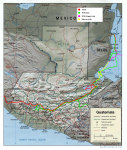
 |
By late January, 2008, Montana was in the middle of a real winter for a change. I was enjoying myself, trying to keep up with my young neighbors, Adin and Zia, skiing and sledding down steep slopes onto the frozen river. We were all having a good time looking for tracks in the snow, listening to hoots and howls and other things going bump in the night. But I was also getting the itch to do some more sailing and sight-seeing. Dona had plane reservations for the middle of February to come down to Guatemala and return from Belize City. Malakii's steering gear was still in pieces in Jennifer's shed, and the struts to support the steering pulleys by the rudder post were gone -- they had rusted out after 30+ years last winter, as Dave and I learned rather awkwardly late one sunny day ... I had completed the job by tearing them out and throwing the rusted stumps overboard when I returned to Rio Dulce, steering with the emergency tiller. I wanted to make sure I didn't do something stupid like start a three month's journey without repairing things. I had some reservations about the state of her transmission, too. All in all, it seemed like a good idea to get my butt in gear, head south, and get things on board back in sailing condition.
Between oil prices, airline obnoxiousness about baggage, and general U.S. government security paranoia, I decided traveling by air was a bad idea. I didn't have as much stuff as I usually do, but when I weighed my bags it was clear I would have to rob a bank to pay the airlines over-weight surcharges.
How absurd these charges are became apparent on the next flight I took, a few months later. The airlines are always moaning about how the increasing cost of fuel means they have to watch the weight of the planes, and that's the reason for clamping down on the baggage weight restrictions. Yeah, right. I pay normal fare for my ticket. I weigh 145 pounds, 155 with clothes on. My checked bags weigh 50 pounds each, plus another 30 for my carry on, for a grand total of 285 pounds. Sitting next to me on the plane, blubber overflowing the armrest, is a bozo wearing a harley jacket who weighs at least 300 pounds. I look around the plane, and at least half of the people are seriously overweight. My lard-laden seat-mate and his baggage totals 430 pounds, and it didn't cost him any more than me. If the airlines really cared about weight and wanted to be equitable about it, they'd charge either by the pound, or make their weight limit a lump sum for baggage and passenger. You hop on the scale with your bags and carry-on and coat and kid-in-your-lap and whatever else you want to bring along, and you pay by the pound or by the pounds over the limit. I'm sure at least half of the world travelers would be delighted, and the other half would finally be paying their proper full price which the rest of us have been subsidizing for years. I don't care what the limits are, as long as the rates are equitably distributed. If I want to take my extra weight as baggage, and someone else wants to take it as extra personal body material, that's fine with me. I just don't want to be told my portion of the airline's weight is less than someone else's and have to pay the same fare. So... I planned to buy some bus tickets, Denver to Guatemala City. I'd drive to Denver, so I could spend a few days with family down there.
A few days before I left my friends Kris and Tom called and asked how I was going down, as they had some extra things they couldn't carry on the plane. Like a refrigeration compressor -- the reason I took the bus ride from hell two years ago. Since they had helped my out on more than one occasion, ferrying gear down for me when they drove down, I figured I should return the favor. I left a hole in one bag and arranged to meet Kris in Helena on my way south to pick up the compressor.
On the day I planned to leave, a snowstorm moved in. I decided to wait a day. The temperature plummeted, -27 at my place, -35 at my neighbor's half a mile away. When I got up in the morning, I discovered the pipes in my on-demand water heater had frozen. I told myself it was a good thing I hadn't left, although if I had left, they wouldn't have frozen because I drain it. I spent the morning mopping up water and brazing the heater back together. At noon, I said good-bye to Prince Charming, my cat, and put him in his cat house with the hot pad on and the light on and some water. My neighbors would see that he got food and water when they came up to feed my horses and theirs. I finally left at noon, barely getting the car started, in spite of having a 500 watt halogen light under it for four hours with a blanket over the hood to help trap the heat. I had to crank it pretty hard even after it started coughing. I was heading to the tropics, but the car was full of sorrels, four winter jackets and vests, and my winter sleeping bag. The driveway was starting to drift over, as it was still blowing, but I made it out ok. There was a little over two feet of snow on the ground. When I got out to the crossroads in the middle of the flat, I discovered the road on out to the highway wasn't plowed, so I had to take the back road towards Missoula a couple of miles. It stays clear more often because it runs east and west. Once on the highway it wasn't too bad, although I didn't want to leave the car stopped for more than a half-hour so it would still start easily.
The snowstorm followed me most of the way to Colorado. After a few days there, I hopped an Americanos (Mexican) bus in Denver, bound for Mexico City via Juarez. Mexico and every Central and South American country have far better bus service than the U.S.; a sad commentary on our public transportation system in general. They did have a scale in the bus station, but no-one was too concerned about my bags. I didn't have that much extra weight, but I did have a 30 lb. box of anchor chain that I carried on in addition to my pack full of stainless fasteners and my banjo. I was the only gringo on the bus; everyone else was heading south to return home or visit family.
I realized I had at least a pound of rechargeable AA batteries with me. Sixteen! My brother Dave's camera, which I borrowed with its waterproof housing, takes two; as does the CD player I bought to listen to some Spanish lessons. What a dumb thing to carry around. If you could put fifteen CDs on a few memory cards, which ought to be possible given that they aren't music, it shouldn't take more than one or two sets of batteries. I should have thought about that a little earlier...
It was a long ride to Juarez, about 24 hours. As we crossed the border, I remembered my problems two years ago when my passport didn't get stamped. I looked around for someone to stamp it... nobody looked too interested. I approached one man and said I needed it stamped, but he just dismissed me and waved me through. grrrrr.... Once past the border garbage, I was transferred to another bus, an express heading south.
I was feeling a bit lost, like I was wandering the world. Or more like it, being pushed around the world. A couple of sentimental movies on the bus made me think a lot about how important the small things are, like having someone to come home to. Two were dubbed in Spanish, one had Spanish subtitles and I couldn't hear half of it so I tried to read them. My Spanish isn't very good, but it's improving.
I met a kid on the bus, about twenty, who was deported two months ago. He had met and married a U.S. citizen, so now they are separated. He is hoping she can get him a green card. Got in on a green card, but after two days quit work. Dumb, but it worked for eight years. Now he's in Acupulco, driving a taxi. On the bus to see his brother in Veracruz. With the housing market crash and a deportation, I think he's unlikely to get back in legally for a long time, if ever.
Many hours later, I was in Mexico City. Having done this once before, I thought I knew what I was doing. Tapachula is the border town near Guatemala, so I purchased a ticket on another bus to Tapachula. The operative word here, unfortunately, was near.
The bus to Tapachula didn't leave for another nine hours. When I was in Juarez and changed buses, they asked me if I wanted to go to Mexico D.F. (the north station), or the south one. For some dumb reason I said D.F., even though I should have known better. Most busses going south leave from the south station. I had gotten a bus to Guatemala City from D.F. the last time, but it was a long wait and it was the only one so it wasn't cheap. So I hadn't learned a lot, in reality...
As I sat my bags passing the time, I wished I wasn't traveling alone. Aside from the companionship, it would make it a heck of a lot easier to go pee, change money, or buy something to eat. I'm sometimes paranoid about leaving my bags unattended, although I'm getting better about it.
The bus finally left, on time, as usual. I leaned back and relaxed, enjoying the ride, especially the countryside as the bus went up and over the mountains. I never think of Mexico as mountainous, but there is some wonderful stuff down there.
The volcanoes south? of Mexico city dominate the landscape. One old and dormant looking, busted up, like a worn out Mt. Rainier. The other smoking, a well-formed cone. Pine forests up near the pass. I think we were traveling east towards... Veracruz? A place called Puebla? A map would be handy... We passed a turn off to Xmu...llalo we didn't take. In Puebla, there's a sign to Oaxaca, Veracruz, and Orizaba. The air seems clear up on the pass but lots of smog in cuidad Mexico and cuidad Puebla (pop >1M). It's a big flat plain down there...
Third world bathrooms suck. I'd rather have a good outhouse, or just peace and quiet away from the rest of the world. At 3:00pm we stopped at the same place we did last time, an hour or so from Veracruz, where highway 150 forks. A sign said we were on the Tinaja - Menatitlan route, whatever that is. Yep, a map would be good... or a better knowledge of Mexican geography. The latter might be more useful in the long run. Those plain, square-tailed black birds were singing; they look kind of like grackles. Coconuts. Ceiba trees. It was starting to feel tropical, and my mind finally began to shift into cruising-time, and I began to relax.
The front seat is great for seeing things, but it's hard on the ears. There was a movie playing and the driver had some marimba, or something like that, music playing on a CD at the same time. Plus the bus was pounding over bumps in the road like riding a railroad track.
We were hurtling through the night in what felt and looked like it must be pretty / interesting country. Going too fast. The towns, all poor, run-down, are a bit scary and make the bus feel like a safe haven. Is that justifiable fear or social conditioning? I was apprehensive about arriving at the border in the dark, but I had no idea where we were or how far from the border. We passed an army check point, but they were busy searching a truck coming the other way. The road alternates between ok and dirt potholed. An ambulance passed us at one point, and then we caught up with it ten minutes later. Not reassuring. The bus actually had seat belts and a safety movie. I put mine on. There was a heck of a cross wind at times; the bus rocked like a boat, weaving around on the road. Not a very secure feeling with other traffic coming at us.
Tapachula is not actually at the border. The bus to Tapachula stops in the city by that name, about 20 km short of the border. That was a $13 taxi ride. When I got to the border, an American woman, Ave Maria, latched on to me and walked me through customs and immigration. I didn't need that, but I appreciated the company at four dark thirty in an unsavory border town. As I feared, immigration in Mexico wouldn't stamp my passport because it wasn't stamped on entry and I didn't have a customs paper I needed. I tried to get him to do it anyway but he just told me to go on. No bribes today... Guatemalan immigration didn't even check for a Mexican exit stamp, fortunately, and just stamped me in. The Guatemalan customs guy said something about not being able to read the date on the exit stamp from Guatemala (it was April, 2007...), and I played a little dumb and pointed at the entry stamp I just got. He said ok, and I was in. I breathed a sigh of relief.
My new acquaintance said she came down here with her Mexican husband on a two week vacation because his father, a big coffee grower, was ill. Dumped her and disappeared, and his family wouldn't tell her anything or have anything to do with her. Who knows what's going on there... Had her fifteen year old son with her, so she sent him home to her mom in Maryland. Says she's been robbed of everything she has, and has to deposit her savings with a Guatemalan woman who owns a small shop. How much of this was real? I don't know, but I'm a sucker and gave her $40 and a book to read as I left. I probably got taken -- she said she had $120 or so saved, enough to get to the US on less than 1st class busses. She knew about missions in the U.S., so why not get to the border, find a church, work a month and go home?
"Es mejor pagar por seguado"??? What the heck does that mean?
Wow! The mountains in northern Guatemala are gorgeous. I thought I saw the volcano by Lago Atitlan. I later learned that was a good bet... there are three of them.
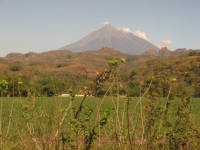 |
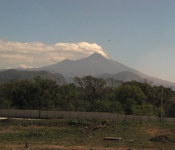 |
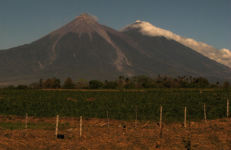 |
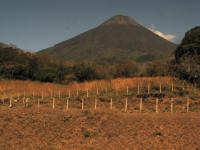 |
| Mexico Volcanoes |
The bus from the border to Guatemala City was crazy, but first class, roomy. The first film they showed was a grade B flick, ok for family consumption. The other I can only classify as a porno flick. On a public, in a Catholic country. Go figure. The worst offenders are always the preacher's kids... They fed us lunch... manufactured ham sandwiches on Bimbo bread, a wonder bread imitation. What is it about the United States that drives us to export the worst aspects of our culture? White bread. Soap operas and television violence. Corporate greed. The notion that money is more important that anything else. The need to hurry all the time. Food laced with pesticide-ridden, unhealthy corn oil and corn syrup.
I was delighted to get to Guatemala city, drag my bags to the Hotel Spring, and relax for a bit.
Damn! I got out my banjo, and it sounded way too soft, so I started tightening up the head and broke it. What a waste of money that (the banjo) was... There's no chance I can find a banjo head down here, and especially not one undersized like this one needs.
Steve at Brunos helped me lug my bags down to the restaurant. I called Jennifer to let her know I was on my way, and she said she'd send Chico up to bring me down. I bought groceries, checked email, and settled down with a watermelon licuado to wait for Chico.
I was delighted to see Jennifer, and she was in good spirits. I unloaded my stuff on Malakii, and started putting things back together and preparing to get to work on my list of boat projects, the big one being putting the steering gear back together. Everything was in pretty good shape except the batteries. They had boiled dry; one of the hazards of leaving a boat unattended. Jennifer felt bad about it, feeling she should have kept them topped off. Probably true, but the controller shouldn't have allowed them to boil dry either. New six volt batteries, good ones, were running $200 each, so I was looking at a $500 expense to replace them. I decided I had nothing to lose by trying drastic measures to revive them.
I boiled the house battery with Jennifer's generator and charger for a couple of hours, and it seemed to help. Then I topped off with battery acid and charged some more. I seemed to hold a charge, although not as well as when it was new. But maybe enough to make it through the season.
The starter battery was in worse shape, and didn't seem to respond to treatment. At Jennifer's suggestion, we drained it, washed it out good, gave it a final rinse with distilled water, and filled it with new battery acid. That seemed to work; when I recommissioned the engine, it started right up. I wasn't real confident in all of that, but it seemed good enough to cruise on. After all, I don't really need the engine... usually. I thought I might be pushing my luck a bit here, but then I reminded myself of my desire to be independent of the engine. One way to make sure is to not be able to start it...
I spent the next few days working on the steering gear struts and got them rebuilt, better than new.
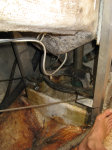 |
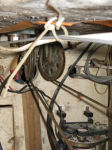 |
| Steering Gear Supports | Pulleys Under Pedestal |
Working on the boat down at Jennifer's is pretty enjoyable for me. I can watch the birds and fish as I work. The neighbors go about the business of living at a leisurely pace. There's time to enjoy a relaxed dinner or lunch or breakfast. It doesn't have to be that way, any more than our lives in the United States have to be frantic and stressed. Partly it's circumstances and living conditions, but it's also a matter of choice. I could be frantic and stressed, and know a lot of people who are, but I've finally learned to relax a bit.
Jennifer had me over for dinner one night for home-made corned beef. I love corned beef and have wanted to make it myself but have never done it. She corned it in a jar, no air, a brine (salt) solution with "some spices." A week or so. It was yummy.
One evening we went over to "Texan Bay," the next bay East, for a hamburger. An ok burger, but I guess I've gotten to where I prefer real food.
Bob Polk, a.k.a. "Fooleish Bob," as his boat is named "Foole," came by and we had a good chat. He was heading up the river and I was going to hitch a ride, but he was staying overnight to watch the superbowl. I didn't need that, so I stayed put where there was peace and quiet. Jennifer's daughter, Jessica, was back on the river; the Minnesota winters were more than she wanted to deal with, so she was hoping to start another restaurant down here. She's a good cook, like her mom, so I hope it's a success.
I had a little over a week before Dona would be coming down, and Malakii was ready to go. I figured I should give the rebuilt steering and batteries a good shake-down before heading up to Belize. It was a perfect opportunity to do some exploring up Lago Izabal, the big lake above the town of Fronteras. After that, I'd pick up Dona in Guatemala City and we'd do some overland exploring in the highlands and the ruins of Copan, Honduras, then sail up to Belize. After that I'd meander back down to Guatemala.
I returned to the Rio on March 25, and spent the night anchored at Livingston. I got up bright and early, anxious to make my way up the river to get Malakii put away. I was hoping to make it to Anapra, Mexico, in time to help an old friend with a construction project. I pulled in the anchor rode, bringing in the chain until the anchor was right below the bow. The water was only eight feet deep, so pulling in the hook and getting under way is usually no big deal. But this time the anchor didn't want to budge. I snubbed it tight, figuring the bobbing of the boat in the swells would break the anchor loose, but it wouldn't give. Ugh. I knew the bottom was littered with junk, and clearly the hook was snagged on something. I didn't really want to go swimming there, but I didn't have a whole lot of choice if I wanted my anchor. I changed to my swimsuit, fins and snorkel, and jumped in. The anchor was buried in a foot of muck and I couldn't see anything, but after a few dives I managed to get the feel of its position. I worked it up and down a little at a time, pulling up first on one side and then the other. After a few more trips to the bottom I was able to roll it over and away from whatever was snagging the flukes. Then I scrambled for the stern, threw my fins in the cockpit, and clambered back aboard. I got the main up and we got underway, headed up the river and home.
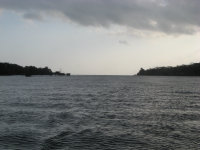 |
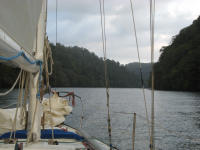 |
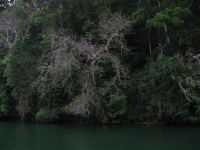 |
| Looking back towards Livingston | Entering Rio Dulce |
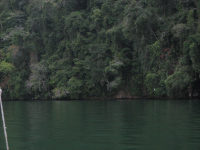 |
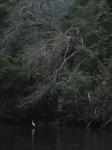 |
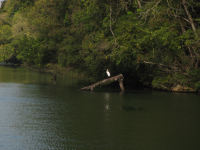 |
| Ibis |
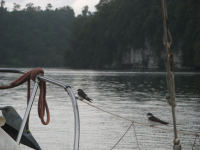 |
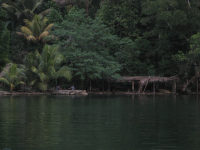 |
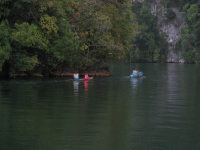 |
| Swallows and Cliffs | Mayan Boathouse | Paddling home |
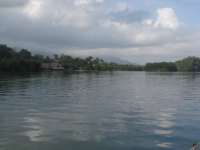 |
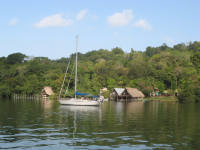 |
| Nearing El Golfete | Ak Tenamit |
I put Malakii up in record time; everything was in working order, and I have the routine mostly down. I wished I could have spent a few weeks winding down and catching up, but I wanted to try to make it to Anapra on schedule.